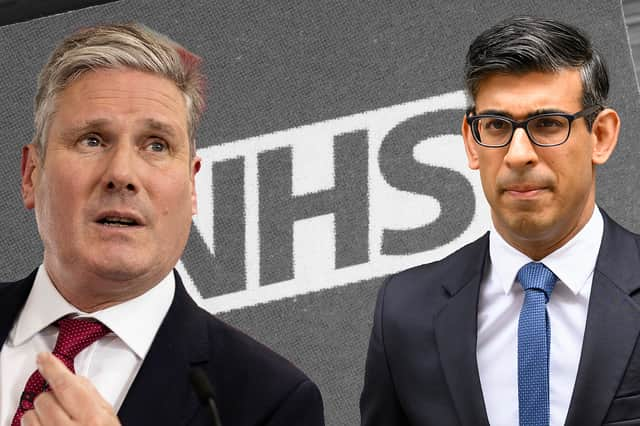PMQs: Sunak and Starmer leave voters thankful for six-week summer break with many questions left unanswered
and live on Freeview channel 276
The six questions from Sir Keir Starmer to Rishi Sunak started with the speaker having to stop MPs from jeering too loudly and ended with the Prime Minister repeating an inaccurate claim about 40 new hospitals being built.
In between these two low points, there was little to inform voters about either side’s offer to the electorate. Questions went unanswered, inaccuracies were repeated and Lindsay Hoyle had to interrupt on multiple occasions to maintain order.
Advertisement
Hide AdAdvertisement
Hide AdPMQs - the most viewed session in the House of Commons every week - has increasingly felt less substantive and more pantomime. Perhaps part of this is down to Rishi Sunak, who has missed almost a fifth of PMQs while he’s been in Number 10 - the highest proportion of any Prime Minister according to Sky News.
In the time being, new Deputy Prime Minister Oliver Dowden has fielded questions - with his stock answer being that he won’t take lectures from Labour, instead of getting to the substance of important policy areas such as child poverty.
Today (19 July), we finally got the Prime Minister at the dispatch box, ahead of three key by-elections, which the Tories are expected to lose.
Starmer started by asking about the NHS waiting list in England, which last week hit a record of 7.47 million people. The PM promised at the start of the year (when it was at 7.2 million) that he would bring this down, a pledge he now looks unlikely to keep.


Advertisement
Hide AdAdvertisement
Hide AdDr Sarah Scobie, the Nuffield Trust's acting director of research, told me last week: "It's not showing any signs of plateauing or going down, but it is really difficult to predict. It's worth noting that the median wait - how long people are waiting on average - has also been steadily going up, so half of patients are waiting more than 14 weeks.
"So there's this building up of people that have got longer and longer waits, which is another factor that makes it more difficult for hospitals to get their total waiting list down. They're needing to balance patients who have been waiting a long time, with perhaps treating people that they could treat quickly to reduce the overall waiting list."
Depressingly, Sunak pinned the blame on striking doctors and nurses, who have gone for years with below inflation pay rises. He said: “The reason that the NHS waiting lists are higher today than they were then – after actually being stable for the first months as we put in place new initiatives – is very simple, and that’s because the NHS has been disrupted by industrial action.”
He then asked Starmer whether he supported the current BMA strikes, or thought the union should take up the government’s pay offer. Sunak was reprimanded by the Speaker, who reminded him it was Prime Minister’s Questions not opposition questions.
Advertisement
Hide AdAdvertisement
Hide AdStarmer noticeably didn’t answer the question. Now he of course isn’t obligated to, but given Labour wants to be seen as a government in waiting, it might be prudent to sound like one. And, on the strikes, the opposition have failed to give decisive answers - instead merely saying they would get around the negotiating table.
The Labour leader later turned his attention to the 40 new hospitals promised by Boris Johnson. A National Audit Office report at the start of the year found that only 32 hospitals are expected to be finished by 2030, and eight of those are not new hospitals.
However, as often is the case with PMQs, reality doesn’t fully matter, and in spite of the NAO report, Sunak declared that the government is going “to deliver on our manifesto commitment to build 40 new hospitals across the country by 2030”.
With the cost of living crisis still biting, mortgages sky-rocketing and the NHS waiting list at record levels - voters would be forgiven for thinking they were watching an alternate reality at PMQs. And then whether Labour is offering a good alternative is another matter.
Either way, for regular watchers of PMQs, summer recess cannot come soon enough.
Comment Guidelines
National World encourages reader discussion on our stories. User feedback, insights and back-and-forth exchanges add a rich layer of context to reporting. Please review our Community Guidelines before commenting.
